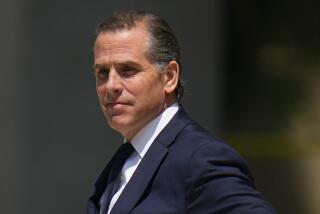Financial crisis panel set to question Wall Street execs
- Share via
Reporting from Washington — The special commission set up by Congress to investigate the causes of the financial crisis will hold its first public hearings next week and is starting at the top in its search for answers -- Wall Street titans.
Goldman Sachs Group Inc. Chief Executive Lloyd Blankfein, JPMorgan Chase & Co. CEO Jamie Dimon and Morgan Stanley Chairman John Mack are among the top managers who will be grilled Wednesday by members of the Financial Crisis Inquiry Commission during the first of two days of hearings.
Commission Chairman Phil Angelides, the former California state treasurer appointed by congressional Democratic leaders to head the panel, promised “tough, probing and fair” questions for the investment bank executives who headed institutions that were “at the center of this storm.”
“I believe the hunger today of the American people to have questions asked on their behalf and to get answers is deeper than ever,” he said Wednesday as he sat with his vice chairman, former congressman Bill Thomas of Bakersfield, in the commission’s offices a block from the White House.
“They see this phenomenon where there was this financial earthquake, and the only buildings that seem to be standing are those that were at the center, with Wall Street seeing record profits, record bonuses,” Angelides said.
Surprisingly, the high-profile heads of Goldman, JPMorgan and Morgan Stanley will be testifying on Capitol Hill for just the second time since the crisis began more than a year ago.
In February they were hammered by members of a House committee for not lending more of their bailout money. Goldman and JPMorgan, along with most other large bailout recipients, have since paid back their billions of dollars in government aid.
The full role of large Wall Street firms in triggering the crisis is still unclear. The decision by the bipartisan commission to bring in the executives for its initial hearing signals an aggressive tack by the panel. Also called to testify next week was Brian Moynihan, the new chief executive of Bank of America Corp., which acquired investment bank Merrill Lynch & Co. in 2008.
Hundreds of witnesses will follow them to the commission’s hearing room, including high-level public officials, regulators and academics, as the commission plans seven more two-day hearings through September.
In two-page letters to the four big-bank executives, all of whom agreed to testify, Angelides and Thomas said the commission wanted to know the “primary errors and business practices” that caused the firms’ financial troubles. Among the specific areas the executives were told to address were lending, risk management policies and executive compensation practices.
As Thomas said, paraphrasing from the Watergate investigation, the commission wants to ask the executives and others, “What did you know and when did you know it, and if you knew then what you know now, what would you have done differently?”
“Each of these appearances are opportunities for folks, in my view, to be able to deal with the past honestly and hopefully put it behind them and us in a way that’s productive,” Angelides said.
The 10-member commission was created by Congress last year to determine the causes of the financial crisis. It has six Democratic appointees and four Republican appointees.
The commission, based on the one that investigated the causes of the September 2001 terrorist attacks, has a Dec. 15 deadline to present its findings and conclusions. Thomas said the hope is to produce a book that contains an easily readable narrative of the crisis, similar to the report by the National Commission on Terrorist Attacks Upon the United States, which became a best-seller.
The panel has hired about 35 staff members and plans to add five to 15 more. Its primary task is to determine the private- and public-sector causes of the financial crisis, as well as to examine the reasons for the problems at major companies that failed or required a government bailout.
It must refer any possible criminal acts it uncovers to authorities.
The commission already has had closed-door meetings with Treasury Secretary Timothy F. Geithner, Federal Reserve Chairman Ben S. Bernanke, Federal Deposit Insurance Corp. Chairwoman Sheila Bair and Securities and Exchange Commission Chairwoman Mary Schapiro, Angelides and Thomas said.
They will be questioned in public hearings as well, and Angelides also expects to call former Treasury Secretary Henry M. Paulson and former Federal Reserve Chairman Alan Greenspan. The commission’s hearings will be broadcast on its website, www.fcic.gov, which is to be fully running by Tuesday.
“At the end of the day,” Angelides said, “I don’t know that we will be the end-all and be-all, but we will hopefully add substantially to people’s understanding of what happened.”
jim.puzzanghera@
latimes.com
More to Read
Inside the business of entertainment
The Wide Shot brings you news, analysis and insights on everything from streaming wars to production — and what it all means for the future.
You may occasionally receive promotional content from the Los Angeles Times.











